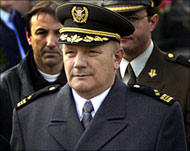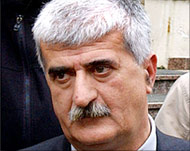Serb official jailed for executing Bosnians
The UN war crimes court has sentenced a former Bosnian Serb policeman to 17 years in jail for the massacre of hundreds of civilians at the edge of a cliff, during the Bosnian war.

Prosecutors had requested a 15 to 20-year jail term for Darko Mrdja for his role in the August 1992 execution of more than 200 people on the picturesque slopes of Mount Vlasic in central Bosnia.
“The sentence you receive should be proportional to all the seriousness, cruelty and inhumanity of the massacre which took the lives of around 200 civilians,” said Dutch judge Alphons Orie on Wednesday.
As sentence was passed, Mrdja, visibly stunned, closed his eyes for a few moments before slowly lowering his head into his hands.
During the trial, prosecutor Alan Tieger had asked the judges to take into the account the “chilling scale” of the massacre.
“A location of exceptional beauty became a mass grave,” Tieger said.
‘Prisoner exchange’
On 21 August 1992, only months after the outbreak of the bitter war in Bosnia that was to last until late 1995, several hundred Muslim and Croat civilians from Prijedor in the northwest of the country were transported by bus to Travnik for what Serb nationalist forces described as “a prisoner exchange.”
|
“A location of exceptional beauty became a mass grave” |
On the journey a unit of Serb policemen, which included Mrdja, stopped the convoy and led about 200 men away. They were shepherded to the edge of a cliff where most of them were murdered.
“As for Mrdja’s role, he was not the architect of the massacre. He was acting in furtherance of superior orders,” Orie said.
“Nevertheless we conclude that the fact that Mrdja personally participated in the selection of the civilians who were going to be killed and in their subsequent murder… makes the crimes charged especially serious”.
Cries for help
During the trial one of 12 survivors gave a harrowing account of his narrow escape from the slaughter.
|
“I cannot remember whether somebody pushed me or whether I instinctively jumped but I fell into the abyss. Just after (the policemen) started shooting and throwing hand grenades …they shot at people crying for help, they had no mercy” Survivor |
“I cannot remember whether somebody pushed me or whether I instinctively jumped but I fell into the abyss. Just after (the policemen) started shooting and throwing hand grenades,” Mujkanovic testified.
“They shot at people crying for help, they had no mercy,” he said.
Surrounded by dead bodies, he managed to crawl behind a rock and escape.
In a statement Mrdja admitted that he “selected these men with the expectation that (they) would be killed”.
Mrdja apologised to the families of the victims during his trial.
“I participated in separating and killing these innocent people,” he said.
“I did not hate these people, I did not do this because I enjoyed doing it but because I was ordered to do so. I did not muster enough courage to disobey this order. If I would have they would have killed me. … This will stay with me until the day I die.”
Top officials indicted
 |
|
(FILES) Indicted retired Croatian |
Meanwhile, the UN war crimes tribunal has indicted four former top Bosnian Croat political and army figures for crimes against Muslims during Bosnia’s 1992-95 war, a Croatian official said on Wednesday.
“All four indictees have been informed of the content of the indictments and have agreed to turn themselves in to The Hague-based tribunal on Monday,” justice ministry official Jaksa Muljacic told the HINA news agency.
Muljacic said the indictments were handed over to the justice ministry by the UN tribunal’s representative earlier on Wednesday.
The four men later turned up at the justice ministry, accompanied by their lawyers.
 |
|
Indicated former defence minister |
Among the four are Jadranko Prlic, the former prime minister and defence minister of the Bosnian Croat separatist statelet of Herceg-Bosna, and Bruno Stojic.
The two others are the generals Slobodan Praljak and Milivoj Petkovic who commanded Bosnian Croat forces known as the HVO during the 1992-95 war.
“I will surrender to the tribunal on Monday … My military carrier is over today,” said Petkovic who currently holds the post of the Croatian army chief inspector.
Former allies
 |
|
Indicted retired Croatian General |
Bosnian Croats and Muslims, although allies against Bosnian Serbs during most of the 1992-95 war, fought each other for 11 months during 1993-94.
Croatia’s then ruling nationalist regime militarily and politically supported secessionist Bosnian Croats, who wanted the Croat-dominated parts of Bosnia to be attached to Croatia.
Croatian television reported earlier that the International Criminal Tribunal for the former Yugoslavia (ICTY) has charged six Bosnian Croats for crimes committed against Muslims during Bosnia’s 1992-95 war.
 |
|
Indicted former PM of Herceg |
Local media said Wednesday that the remaining two indictments were delivered to Sarajevo.
According to media, those two are against the former commander of Bosnian Croat military police Valentin Coric and an unnamed member of the Bosnian Croat military police.
Under the peace agreement that ended Bosnia’s 1992-95 war the secessionist mini-state of Herceg-Bosna was dissolved and its powers formally handed over to Bosnia’s Muslim-Croat Federation.
The peace deal has split Bosnia into two semi-independent entities – the Muslim-Croat Federation and the Serbs’ Republika Srpska. The two entities, linked by weak central institutions, have each their own government, parliament, army and police.
Meanwhile, the United States suspended millions of dollars in assistance to Serbia on Wednesday after US Secretary of State Colin Powell determined that Belgrade was not fully cooperating with the UN war crimes tribunal, State Department officials said.